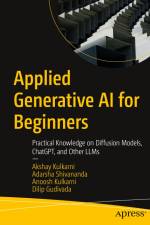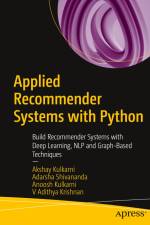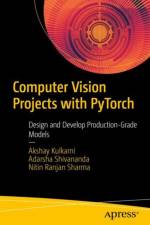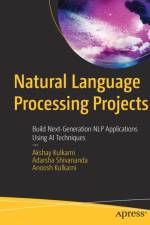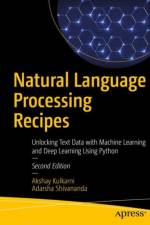Bøger af Akshay Kulkarni
-
463,95 kr. This book provides a deep dive into the world of generative AI, covering everything from the basics of neural networks to the intricacies of large language models like ChatGPT and Google Bard. It serves as a one-stop resource for anyone interested in understanding and applying this transformative technology and is particularly aimed at those just getting started with generative AI.Applied Generative AI for Beginners is structured around detailed chapters that will guide you from foundational knowledge to practical implementation. It starts with an introduction to generative AI and its current landscape, followed by an exploration of how the evolution of neural networks led to the development of large language models. The book then delves into specific architectures like ChatGPT and Google Bard, offering hands-on demonstrations for implementation using tools like Sklearn. Yoüll also gain insight into the strategic aspects of implementing generative AI in an enterprise setting, with the authors covering crucial topics such as LLMOps, technology stack selection, and in-context learning. The latter part of the book explores generative AI for images and provides industry-specific use cases, making it a comprehensive guide for practical application in various domains.Whether you're a data scientist looking to implement advanced models, a business leader aiming to leverage AI for enterprise growth, or an academic interested in cutting-edge advancements, this book offers a concise yet thorough guide to mastering generative AI, balancing theoretical knowledge with practical insights.What You Will LearnGain a solid understanding of generative AI, starting from the basics of neural networks and progressing to complex architectures like ChatGPT and Google BardImplement large language models using Sklearn, complete with code examples and best practices for real-world applicationLearn how to integrate LLM¿s in enterprises, including aspects like LLMOps and technology stack selectionUnderstand how generative AI can be applied across various industries, from healthcare and marketing to legal compliance through detailed use cases and actionable insightsWho This Book Is ForData scientists, AI practitioners, Researchers and software engineers interested in generative AI and LLMs.
- Bog
- 463,95 kr.
-
437,95 kr. This book will teach you how to build recommender systems with machine learning algorithms using Python. Recommender systems have become an essential part of every internet-based business today.You'll start by learning basic concepts of recommender systems, with an overview of different types of recommender engines and how they function. Next, you will see how to build recommender systems with traditional algorithms such as market basket analysis and content- and knowledge-based recommender systems with NLP. The authors then demonstrate techniques such as collaborative filtering using matrix factorization and hybrid recommender systems that incorporate both content-based and collaborative filtering techniques. This is followed by a tutorial on building machine learning-based recommender systems using clustering and classification algorithms like K-means and random forest. The last chapters cover NLP, deep learning, and graph-based techniques to build a recommender engine. Each chapter includes data preparation, multiple ways to evaluate and optimize the recommender systems, supporting examples, and illustrations.By the end of this book, you will understand and be able to build recommender systems with various tools and techniques with machine learning, deep learning, and graph-based algorithms.What You Will LearnUnderstand and implement different recommender systems techniques with PythonEmploy popular methods like content- and knowledge-based, collaborative filtering, market basket analysis, and matrix factorization Build hybrid recommender systems that incorporate both content-based and collaborative filteringLeverage machine learning, NLP, and deep learning for building recommender systemsWho This Book Is ForData scientists, machine learning engineers, and Python programmers interested in building and implementing recommender systems to solve problems.
- Bog
- 437,95 kr.
-
533,95 kr. Design and develop end-to-end, production-grade computer vision projects for real-world industry problems. This book discusses computer vision algorithms and their applications using PyTorch.The book begins with the fundamentals of computer vision: convolutional neural nets, RESNET, YOLO, data augmentation, and other regularization techniques used in the industry. And then it gives you a quick overview of the PyTorch libraries used in the book. After that, it takes you through the implementation of image classification problems, object detection techniques, and transfer learning while training and running inference. The book covers image segmentation and an anomaly detection model. And it discusses the fundamentals of video processing for computer vision tasks putting images into videos. The book concludes with an explanation of the complete model building process for deep learning frameworks using optimized techniques with highlights on model AI explainability.After reading this book, you will be able to build your own computer vision projects using transfer learning and PyTorch.What You Will LearnSolve problems in computer vision with PyTorch.Implement transfer learning and perform image classification, object detection, image segmentation, and other computer vision applicationsDesign and develop production-grade computer vision projects for real-world industry problemsInterpret computer vision models and solve business problemsWho This Book Is ForData scientists and machine learning engineers interested in building computer vision projects and solving business problems
- Bog
- 533,95 kr.
-
550,95 kr. Leverage machine learning and deep learning techniques to build fully-fledged natural language processing (NLP) projects. Projects throughout this book grow in complexity and showcase methodologies, optimizing tips, and tricks to solve various business problems. You will use modern Python libraries and algorithms to build end-to-end NLP projects. The book starts with an overview of natural language processing (NLP) and artificial intelligence to provide a quick refresher on algorithms. Next, it covers end-to-end NLP projects beginning with traditional algorithms and projects such as customer review sentiment and emotion detection, topic modeling, and document clustering. From there, it delves into e-commerce related projects such as product categorization using the description of the product, a search engine to retrieve the relevant content, and a content-based recommendation system to enhance user experience. Moving forward, it explains how to build systems to find similar sentences using contextual embedding, summarizing huge documents using recurrent neural networks (RNN), automatic word suggestion using long short-term memory networks (LSTM), and how to build a chatbot using transfer learning. It concludes with an exploration of next-generation AI and algorithms in the research space. By the end of this book, you will have the knowledge needed to solve various business problems using NLP techniques.What You Will LearnImplement full-fledged intelligent NLP applications with PythonTranslate real-world business problem on text data with NLP techniquesLeverage machine learning and deep learning techniques to perform smart language processingGain hands-on experience implementing end-to-end search engine information retrieval, text summarization, chatbots, text generation, document clustering and product classification, and moreWho This Book Is ForData scientists, machine learning engineers, and deep learning professionals looking to build natural language applications using Python
- Bog
- 550,95 kr.
-
- Unlocking Text Data with Machine Learning and Deep Learning using Python
642,95 kr. - Bog
- 642,95 kr.

